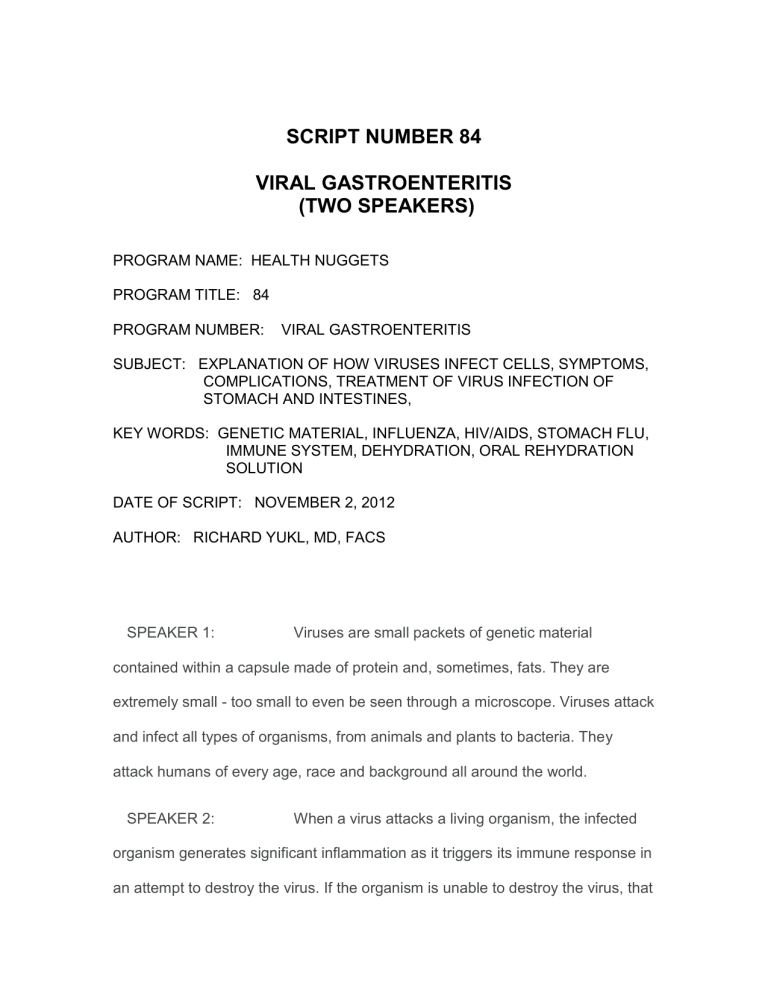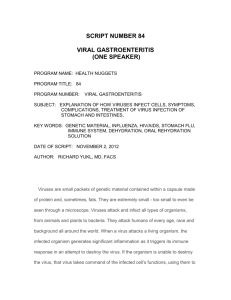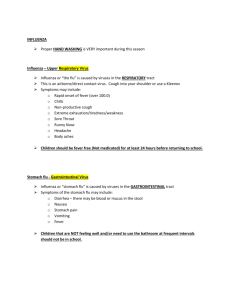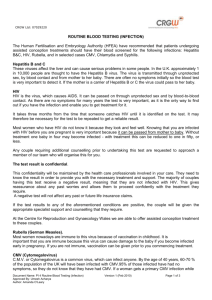script number 84 viral gastroenteritis (two speakers)

SCRIPT NUMBER 84
VIRAL GASTROENTERITIS
(TWO SPEAKERS)
PROGRAM NAME: HEALTH NUGGETS
PROGRAM TITLE: 84
PROGRAM NUMBER: VIRAL GASTROENTERITIS
SUBJECT: EXPLANATION OF HOW VIRUSES INFECT CELLS, SYMPTOMS,
COMPLICATIONS, TREATMENT OF VIRUS INFECTION OF
STOMACH AND INTESTINES,
KEY WORDS: GENETIC MATERIAL, INFLUENZA, HIV/AIDS, STOMACH FLU,
IMMUNE SYSTEM, DEHYDRATION, ORAL REHYDRATION
SOLUTION
DATE OF SCRIPT: NOVEMBER 2, 2012
AUTHOR: RICHARD YUKL, MD, FACS
SPEAKER 1: Viruses are small packets of genetic material contained within a capsule made of protein and, sometimes, fats. They are extremely small - too small to even be seen through a microscope. Viruses attack and infect all types of organisms, from animals and plants to bacteria. They attack humans of every age, race and background all around the world.
SPEAKER 2: When a virus attacks a living organism, the infected organism generates significant inflammation as it triggers its immune response in an attempt to destroy the virus. If the organism is unable to destroy the virus, that
virus takes command of the infected cell’s functions, using them to generate new virus particles. These new viruses then either kill the cell that formed them as they leave, trigger non-cancerous disease in the infected cell, or cause the infected cell to become transformed into cancer.
SPEAKER 1: We have talked about virus infections in the past when we discussed influenza, an infection of the nose, throat and lungs, and
HIV/AIDS, a life-threatening viral infection that destroys our immune system.
Today, we want to talk about yet another viral infection, one that attacks our sto mach and our entire intestinal tract. The infection’s scientific name is viral gastroenteritis, but most people know it as the stomach flu. Worldwide, every year, about one person in a hundred suffers stomach flu.
SPEAKER 1: stomach flu?
How do I become infected with the virus that causes
SPEAKER 2: Spread is either through contact with an infected person or by eating food and water that is contaminated with the virus. Raw and undercooked meat and seafood, especially shellfish such as oysters, can infect you. You can also become infected by sharing eating utensils, towels or food with someone who is infected. Sadly, many times you become infected because someone who prepared your food did not wash their hands after using the toilet.
SPEAKER 1: What kind of symptoms can I expect if I become infected?
SPEAKER 2: Symptoms range from mild to severe. They appear within
one to three days after infection, and they usually last just a day or two, although they can occasionally last as long as 10 days. As the virus attacks your stomach, you will develop nausea with or without vomiting, and a low-grade fever. Infection of your intestines causes abdominal cramps, pain and watery diarrhea. The diarrhea does not contain blood. Bloody diarrhea would mean you have a different, and more severe infection.
SPEAKER 1: Isn’t the stomach flu only a minor illness?
SPEAKER 2: It is not a serious illness for most people. The immune system of a healthy person can destroy the virus, and people almost always recover completely without any long-term problems. It is a serious illness, however, for people who have an immature or a damaged immune system, and also for those unfortunate people who are unable to drink enough fluids to replace what they lose through vomiting and diarrhea. Infants, young children, and those disabled and elderly who are unable to care for themselves, are at greatest risk. These groups of people develop a more serious illness with more vomiting and diarrhea. They can suffer fluid that is so severe that it is life threatening, and that requires them to be hospitalized for replacement of fluids by vein.
SPEAKER 1: How should I treat the stomach flu?
SPEAKER 2: Antibiotics are not effective in fighting virus infections, so avoid taking antibiotics unless a physician specifically recommends them. The
most important goal of treatment is to prevent severe loss of bodily fluids. It should begin at home. If you are a healthy adult, l et your stomach rest while your body fights the virus. Stop eating solid foods, and avoid dairy products, caffeine, alcohol and nicotine until you feel better. Instead of eating solid foods, try sucking on ice chips or taking small sips of water or clear broths. Drink plenty of liquid every day, but take small, frequent sips. As your symptoms improve, gradually begin to eat bland, easy-to-digest foods such as soda crackers, toast and bananas, but stop eating if your nausea returns. Also, get plenty of rest.
SPEAKER 1: How should someone with an immature or a damaged immune system treat a stomach flu infection?
SPEAKER 2: As compared to healthy adults, infants and children can become dangerously ill very rapidly. Watch for signs of dehydration in your sick infant or child by comparing how much they drink and urinate with how much is normal for them. You should take them to a doctor if they begin to show signs of dehydration, or if they become unusually sleepy or unresponsive. Also, spitting up may be an everyday occurrence for your baby, but vomiting is not. See a doctor right away if your baby develops vomiting that lasts more than several hours, or if they develop severe diarrhea.
SPEAKER 1: How can I prevent getting the stomach flu?
SPEAKER 2: Because there is no effective medicine to treat viral gastroenteritis once you have the infection, prevention is key. In addition to
avoiding food and water that may be contaminated, thorough and frequent hand washing is your best defense. Wash your hands thoroughly, especially after using the toilet. Use warm water and soap and rub your hands vigorously for at least 20 seconds, then rinse thoroughly, and dry your hands using a clean towel.
Avoid sharing eating utensils, glasses and plates. If possible, avoid close contact with anyone who has the virus. Finally, get vaccinated. A vaccine against gastroenteritis is now available in some countries, and it appears to be effective in preventing the most severe symptoms of this infection.
SPEAKER 1: Health Nuggets is written by Dr. Richard Yukl, a medical doctor working in the United States. The medical views expressed in this program are his and may differ for your particular health needs. If you need medical advice, please consult a medical professional in your area.





